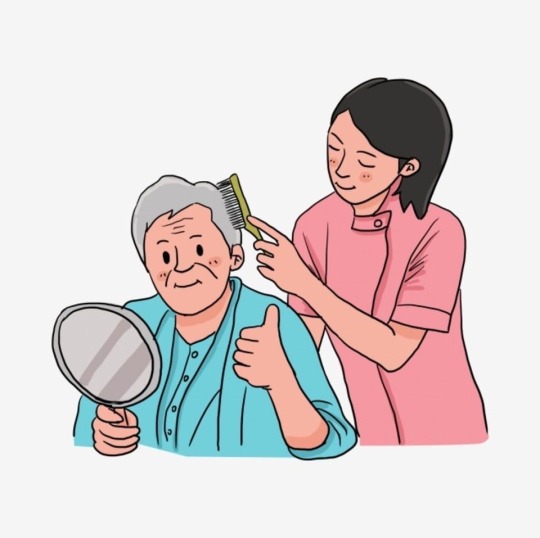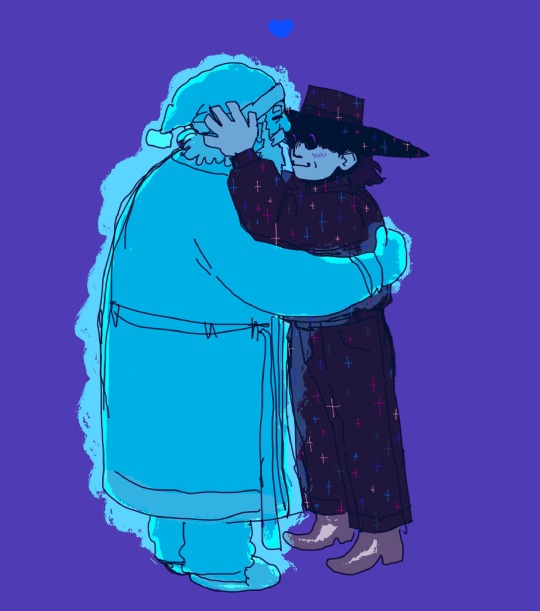#geriatrics
Text
“Pay attention, even if you want to be a pediatrician, because guess who brings children to the doctor when the parents are working.”
Geratrician.
78 notes
·
View notes
Text
Look at what I am reading in the Bible. “Stand up in the presence of the elderly, and show respect for the aged. Fear your God. I am the Lord.”
Leviticus 19:32
I think I have a good job. I am a certified nurse assistant. I take care of the elderly in a nursing home. It is not easy to take care of the elderly sometimes because some patients have dementia, weakness, and psychological illnesses. They get confused and anxious. In my opinion, you have to have a kind and patient heart with them. You also need to have a humbled heart. As a nurse assistant, we have to clean the patient. Clean them like change their diaper and clean their room because infection control is a thing. Shower them. Feed them. Give them companionship. I also have noticed that taking care of the elderly has helped me respect my parents more. Also think of God more. I like to pray with the patients because some patients love it when I pray for them. So, I like this Bible verse how God says we need to respect the elderly. God knows everything we do. Nothing is hidden from Him.

#nursing#cna#certified nurse assistant#licensed practical nurse#registered nurse#geriatrics#gerontology#elderly#follow#catholic#love#christian#grace#friendship#dating#marriage#empath#courtship#service oriented#nursing home#kindness#patience#Godly
3 notes
·
View notes
Text
Long before the pandemic, the threat of illness was already very real for older people. Where America has landed is hardly a new way of life but rather one that is simply more onerous. “One way to think about it is that this is a new risk that’s out there” alongside other natural causes of death, such as diabetes and heart failure, Black said. But it’s a risk older Americans can’t ignore, especially as the country has dropped all COVID precautions. Since Christmas Eve, I have felt uneasy about how readily I normalized putting so little effort into protecting my nonagenarian loved ones, despite knowing what might happen if they got sick. For older people, who must contend with the peril of attending similar gatherings, “there’s sort of no good choice,” Black said. “The world has changed.”
But this new post-pandemic reality also includes insidious effects on older people that aren’t directly related to COVID itself. Those who put off nonemergency visits to the doctor earlier in the pandemic, for example, risked worsening their existing health conditions. The first year of the pandemic plunged nearly everyone into isolation, but being alone created problems for older adults that still persist. Before the pandemic, the association between loneliness and higher mortality rates, increased cardiovascular risks, and dementia among older adults was already well established. Increased isolation during COVID amplified this association.
The consequences of isolation were especially profound for older adults with physical limitations, Naoko Muramatsu, a community-health professor at the University of Illinois at Chicago, told me. When caregivers or family members were unable to visit, people who required assistance for even the smallest tasks, such as fetching the mail and getting dressed, had no options. “If you don’t walk around and if you don’t do anything, we can expect that cognitive function will decline,” Muramatsu said; she has observed this firsthand in her research. One Chinese American woman, interviewed in a survey of older adults living alone with cognitive impairment during the pandemic, described the debilitating effect of sitting at home all day.“I am so useless now,” she told the interviewer. “I am confused so often. I forget things.”
Even older adults who have weathered the direct and indirect effects of the pandemic still face other challenges that COVID has exacerbated. Many have long relied on personal caregivers or the staff at nursing facilities. These workers, already scarce before the pandemic, are even more so now because many quit or were affected by COVID themselves. “Long-term care has been in a crisis situation for a long time, but it’s even worse now,” Muramatsu said, noting that many home care workers are older adults themselves. Nursing homes nationwide now have nearly 200,000 fewer employees compared with March 2020, which is especially concerning as the proportion of Americans over age 65 explodes.
Older people won’t have one single approach to contending with this sad reality. “Everybody is trying to figure out what is the best way to function, to try to have some level of everyday life and activity, but also keep your risk of getting sick as low as possible,” Brangman said. Some of her patients are still opting to be cautious, while others consider this moment their “only chance to see grandchildren or concerts or go to family gatherings.” Either way, older Americans will have to wrestle with these decisions without so many of their peers who have died from COVID.
Again, many of these people did not have it great before the pandemic, even if the rest of the country wasn’t paying attention. “We often don’t provide the basic social support that older people need,” Kenneth Covinsky, a clinician-researcher at the UCSF Division of Geriatrics, said. Rather, ageism, the willful ignorance or indifference to the needs of older people, is baked into American life. It is perhaps the main reason older adults were so badly affected by the pandemic in the first place, as illustrated by the delayed introduction of safety precautions in nursing homes and the blithe acceptance of COVID deaths among older adults. If Americans couldn’t bring themselves to care at any point over the past three years, will they ever?
— Life Is Worse for Older People Now
#yasmin tayag#life is worse for older people now#current events#medicine#healthcare#geriatrics#elder care#elder neglect#caretaking#epidemiology#covid 19#pandemic#naoko muramatsu#kenneth covinsky
1 note
·
View note
Text

We have an inpatient with old dog vestibular disease. The good news is that this is treatable, and these guys usually recover quickly with just supportive care! But as someone who gets vertigo, I always feel so sorry for them because that feeling is the worst @.@
#old dog vestibular disease#idiopathic vestibular disease#idiopathic vestibular syndrome#old dog vestibular syndrome#neurology#links#vestibular#vertigo#geriatrics#dogs
9 notes
·
View notes
Link
So there's something called Beers list, which is a list of medications that elderly pts are not supposed to take. I remember learning that mirtazapine (Remeron) can be given to older ladies who don't eat enough to stimulate appetite, but it's apparently contraindicated unless the woman had weight loss and depression. I mean I know it's an antidepressant too, but whatever.
4 notes
·
View notes
Text
An AI tool utilizes data from individual cells within tumors to forecast responses to cancer therapy

- By InnoNurse Staff -
Research demonstrates the efficacy of machine learning in anticipating treatment results by leveraging comprehensive data from single-cell omics.
Read more at Sanford Burnham Prebys
///
Other recent news and insights
Study reveals ChatGPT's potential as a tool for medication management, potentially enhancing geriatric healthcare services (Mass General Brigham)
#medtech#health tech#ai#genomics#machine learning#oncology#cancer#digital health#chatgpt#genai#generative ai#medication#medication management#aging#geriatrics#data science
0 notes
Text
Rev. Joe’s Random Thought #8,301
yeah I know you did not ask!
You should so be blessed – well cursed at times actually – with a mind such as mine, making all these weird connections between my rumored neurons. Just be thankful that I do not share all of my random thoughts.
Geriatrics: That branch of medical science whose conceit is that they can manage the ongoing train wreck that is old age, knowing all along the inevitable…
View On WordPress
0 notes
Text
growing up is not about finding yourself and having fun it’s about figuring out what kind of healthcare specialist you’re going to need for the rest of your life
0 notes
Text
Right now Israel's bombing Rafah, the last refuge for a million Palestinians, where they were previously ORDERED to evacuate to and are now trapped in while the US news cycle is dominated by Big Football Game And Celebrities In Attendance (at which Israel also aired a million dollar propaganda video). I wish I could say this is unbelievable.
#two zionists lacing up their boots to take the stage while Israel is targeting mosques and areas near hospitals at the one refuge left#I actually feel like I'm going insane#and the geriatric hag at the wheel of that country who's name rhymes with snow pie den is tweeting 'ah superbowl!'#like girl get the fuck up and kill yourself first of all
13K notes
·
View notes
Text
I’ll be glad when my 3-day 16hr shift weekend with my dementia patients is over so I can chill and play BG3 because all I’ve done this weekend is:
Deadlift a grown ass combative man while my 5ft5in 125lb self tries not to drop him and dodging elbows to the chest
Kept two old ladies from bullying another old lady bc one of them is convinced every purse they see is theirs
Dealt with a little old lady commenting q5min that nobody ever feeds her(while sitting down for meals), nobody ever visits her(after her sister comes to visit) and that everybody is getting fired
Old man looking out the window to see how foggy and rainy it is then turn around and say, “that sun sure is bright today”
Another old lady punched a hole in the wall after slapping me across the face yesterday
Just another weekend at the nursing home but you better believe I’m abusing muscle relaxers when i get home tonight.
1 note
·
View note
Text
Geriatrician: Look, as long as you know the score names you can search for them and won’t need to memorize them.
Student: Take that, rheumatology.
26 notes
·
View notes
Text
instagram
‘Living Old,’ FRONTLINE’s #documentary (2006) on #geriatrics
#oldage #livingold #gettingold
📸 AI is wrong. Actual beautified photo in 2021 (Left) compared with AI projected wrong age at 70 photo in 2031 (Right).
0 notes
Text
Brain health and better memory for seniors stay off of NyQuil, p.m. and Benadryl among others. This woman is a MD PhD geriatrician of which only about 3% of doctors go into that field.
Basically, a lot of drugs break down and block acetylcholine. That’s what the brain needs for signaling this is a great non-commercial video.
youtube
View On WordPress
0 notes
Text
The pandemic was destined to come after older Americans. Their immune systems tend to be weaker, making it harder for them to fight off an infection, and they are more likely to have comorbidities, which further increases their risk of severe illness. The precarity that many of them already faced going into 2020—poverty, social isolation and loneliness, inadequate personal care—left them poorly equipped for the arrival of the novel coronavirus. More than 1 million people lived in nursing homes, many of which were densely packed and short on staff when COVID tore through them.
A major reason older people are still at risk is that vaccines can’t entirely compensate for their immune systems. A study recently published in the journal Vaccines showed that for vaccinated adults ages 60 and over, the risk of dying from COVID versus other natural causes jumped from 11 percent to 34 percent within a year of completing their primary shot series. A booster dose brings the risk back down, but other research shows that it wears off too. A booster is a basic precaution, but “not one that everyone is taking,” Black, a co-author of the study, told me. Booster uptake among older Americans for the reengineered “bivalent” shots is the highest of all age groups, but still, nearly 60 percent have not gotten one.
For every COVID death, many more older people develop serious illness. Risk increases with age, and people older than 70 “have a substantially higher rate of hospitalizations” than those ages 60 to 69, Caitlin Rivers, an epidemiologist at Johns Hopkins University, told me. Unlike younger people, most of whom fully recover from a bout with COVID, a return to baseline health is less guaranteed for older adults. In one study, 32 percent of adults over 65 were diagnosed with symptoms that lasted well beyond their COVID infection. Persistent coughs, aches, and joint pain can linger long after serious illness, together with indirect impacts such as loss of muscle strength and flexibility, which can affect older people’s ability to be independent, Rivers said. Older COVID survivors may also have a higher risk of cognitive decline. In some cases, these ailments could be part of long COVID, which may be more prevalent in older people.
Certainly, some older adults are able to make a full recovery. Brangman said she has “old and frail” geriatric patients who bounced back after flu-like symptoms, and younger ones who still experience weakness and fatigue. Still, these are not promising odds. The antiviral Paxlovid was supposed to help blunt the wave of old people falling sick and ending up in the hospital—and it can reduce severe disease by 50 to 90 percent. But unfortunately, it is not widely used; as of July, just a third of Americans 80 or older took Paxlovid.
The reality is that as long as the virus continues to be prevalent, older Americans will face these potential outcomes every time they leave their home. That doesn’t mean they will barricade themselves indoors, or that they even should. Still, “every decision that we make now is weighing that balance between risk and socialization,” Brangman said.
— Life Is Worse for Older People Now
#yasmin tayag#life is worse for older people now#current events#medicine#healthcare#geriatrics#elder care#epidemiology#immunology#covid 19#pandemic#paxlovid#nirmatrelvir/ritonavir#caitlin rivers
1 note
·
View note
Text



what if there were 2 old fucks… can u imagine
#stardew valley#stardew valley spoilers#sdv#sdv spoilers#grandpa#mister qi#mr. qi#sorry for posting the evil geriatric guys from stardew so much lately i promise you i did not plan this#i dont care about anything else in this game i just want to know that these 2 did lsd together in the sdv equivalent of the 60s#and then like one of them became an immortal billionaire and one of them died and its a weird situation but they are making it work
1K notes
·
View notes
